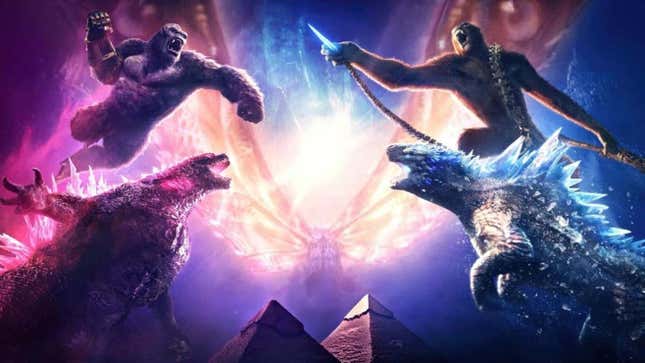This year’s a big one for Warner Bros. and Legendary Pictures’ MonsterVerse: the Godzilla film that kicked off the whole shebang turned 10 earlier in May, and its direct sequel Godzilla: King of the Monsters has now hit the five-year mark. The newest MonsterVerse entry, Godzilla x Kong: The New Empire, came out in late March and is both 2024’s second-highest grossing film so far and also the highest-grossing film for the entire Godzilla brand.
These movies are the new Transformers films, coming out at such a consistent clip and being such solid money makers that it nearly sneaks up on you how far the franchise has come over the past decade. Gareth Edwards’ Godzilla had its fans back in 2014, but many felt that film didn’t entirely live up to the potential its trailers had been selling. The tide really turned around with 2017’s Kong: Skull Island, which tossed aside Godzilla’s grey-brown color palette and forgettable story of a soldier trying to reach his family. Instead, Jordan Vogt-Roberts’ 1973-set Skull Island is just constantly on one: whether it’s Tom Hiddleston slicing bird monsters with a katana, army soldiers getting impaled through the mouth by giant bugs, or Shea Whigham completely beefing a well-intentioned sacrifice, the movie’s entire motto is to have fun with this. You’ve got a giant monkey as your title character, so why not have him stomp around an island full of monsters more vicious than him and put some poor humans in the middle of it all?

That energy is so infectious that it’s run throughout the movies in Skull Island’s wake. Michael Dougherty’s 2019 Godzilla: King of the Monsters, which functions partially as a soft reboot for this Godzilla iteration, has so many monsters and thundering set pieces you kind of have to just roll with it even before Rodan burns up Mexico just by the simple act of flying over it. How did the MonsterVerse get this far, and why? It helps that WB and Legendary have the good sense to let these movies breathe. There’s been a two or three-year gap between each installment, which doesn’t sound like a lot until you remember the franchise is allowed to go away. Unlike something like Marvel or DC, you’re not really asked to think about them all the time on a 24/7 basis. WB and Legendary clearly love that this is a franchise, but they’ve deployed a surprising amount of restraint on what the MonsterVerse is and could be, and aren’t in a hurry to beat it over audiences’ heads.
Another point in its favor is how each director has managed to bring something new to the table, from a style perspective. While not all the movies are in conversation with each other, it does feel like they each have distinct identities and were helmed by directors given free reign to do whatever they want. You can tell Godzilla’s HALO jump is Edwards because it’s played almost like a descent into hell while Vogt-Roberts’ Skull Island is frequently meaner to its characters. The type of spectacle that Adam Wingard pulls off in his two movies—Kong resetting his shoulder by slamming it into a skyscraper or his entire New Empire arc of a reluctant old man fighting what’s essentially a neighborhood bully—is much different from that of Dougherty, who approached the Titans of King of the Monsters as majestic, terrifying beasts that make you stop and stare when you should really head for the hills. Tentpole franchises often get dinged for homogenizing their directors, but that’s thankfully not the case here.
With a rotating set of directors and characters, plus recent TV spinoffs Monarch: Legacy of Monsters and Skull Island, the MonsterVerse has gotten a surprising amount of mileage that’s yet to really wear thin. Perhaps the biggest weak point of the whole thing is Godzilla himself: after King of the Monsters, he’s largely operated as a special guest star to what’s ended up largely becoming a Kong and Monarch vehicle. Both crossover movies just aren’t fully interested in him like they are with Kong, a feeling further heightened by the fact the two monsters haven’t really gotten to be out of each other’s orbit. Some of this may come from whatever rights issues there are with Toho, but given that we may be looking at a third team-up movie in a row within the next few years, it’s something that’ll need to be addressed soon.
Or maybe it doesn’t; part of what makes the MonsterVerse so interesting is that five movies and two TV shows in, it’s yet to establish a new definitive end goal. Godzilla vs. Kong felt more like a midpoint to put the two monsters in a new pair of status quos that’ve yet to be fully explored. A lack of definitive shot calling works more than it should, and fits with the franchise’s overall goal: to just deliver a good experience, one utterly destroyed city at a time.
Want more io9 news? Check out when to expect the latest Marvel, Star Wars, and Star Trek releases, what’s next for the DC Universe on film and TV, and everything you need to know about the future of Doctor Who.




















+ There are no comments
Add yours